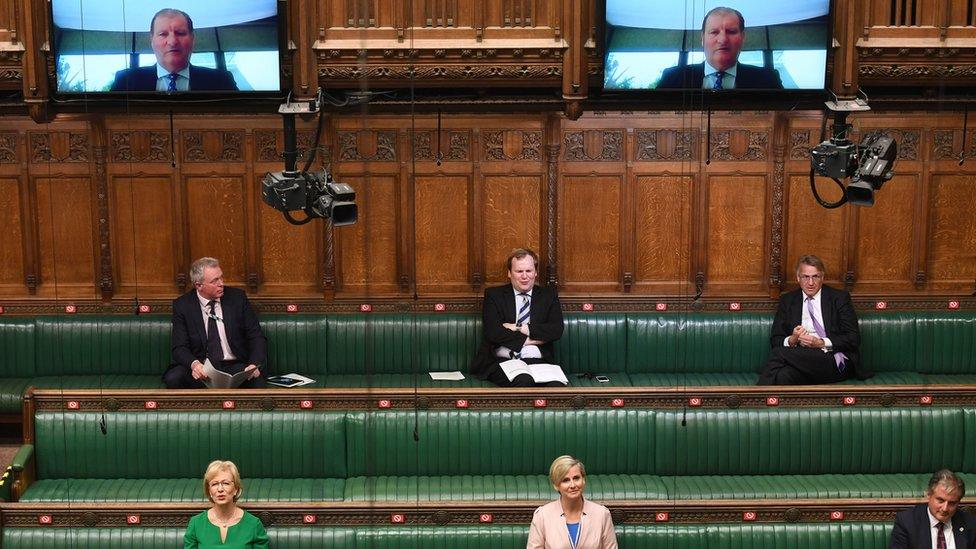Coronavirus: MPs anxious over return to virus 'hotspot'
- Published
- comments
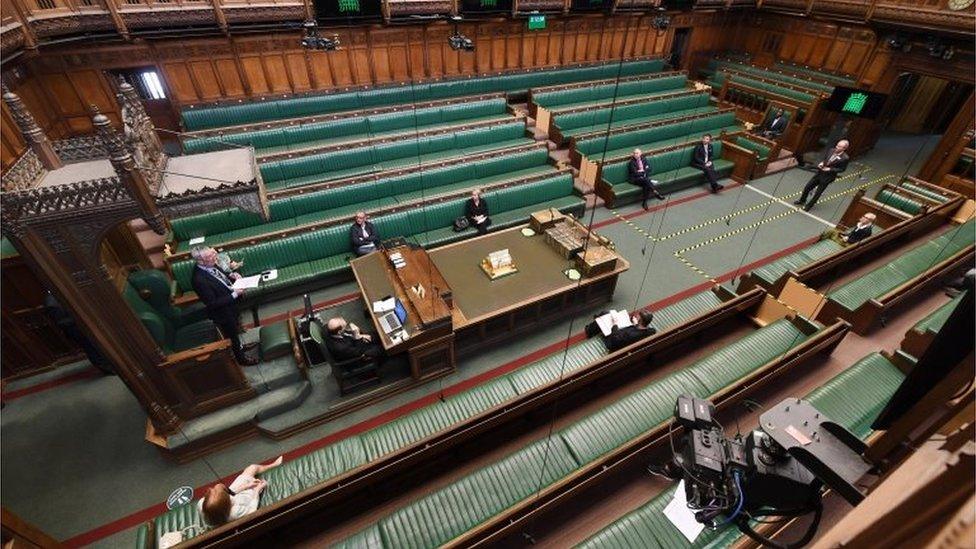
The number of MPs allowed in the chamber will be restricted
MPs return to Westminster on Tuesday and while some can't wait others say it is far too early and are angry about the end of working from home.
The government insists they will be kept safe from coronavirus with new working practices and it is important that they get back to work to set an example to the rest of the country.
Commons leader Jacob-Rees Mogg argues that the semi-virtual "hybrid" Commons - that saw some MPs in the chamber and others contributing via Zoom - was a poor substitute for the real thing.
But Labour MP Vicky Foxcroft says the ending of the "hybrid" Parliament is forcing her to make a dangerous choice.
The shadow minister for disabilities says she has to "ignore [the advice] and put myself in danger or I cannot participate in Parliament".
"We have been disenfranchised, we cannot fulfil our roles. We should be leading by example and not exclude people with disabilities."
The Lewisham and Deptford MP says she plans to raise the concerns of people shielding at home: "We need to be in there raising those issues. Who else is going to be?"
'Extremely angry'
For other MPs, the return of Parliament brings with it the issue of travel and how to get to central London safely.
"I am extremely angry about it," says Lib Dem MP Alistair Carmichael, speaking from his family home in Orkney - about 800 miles away from Westminster.
"I think we can continue with the virtual Parliament until it is a safe for everyone to return.
"The reasons for not doing that seems to have more to do with internal Tory party management than to do with government accountability."
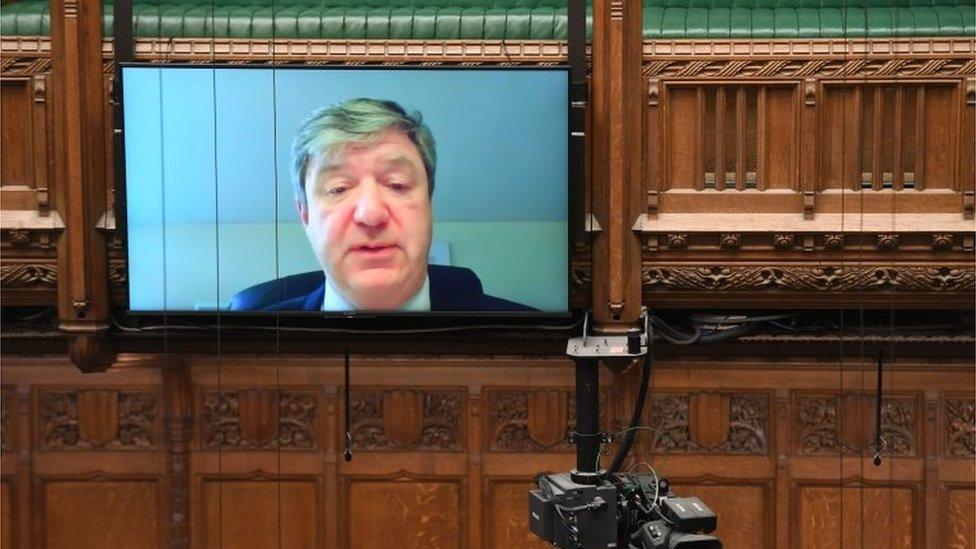
Mr Carmichael participating in the House of Commons over video link
Mr Carmichael, who represents the seat of Orkney and Shetland, the most northerly parliamentary constituency in the UK, says it will take him about 18 hours to travel to Westminster.
With transport options limited because of the coronavirus outbreak, he will travel by plane and two trains to London.
"I am not going to do that every week, it is not feasible and it is currently not safe," he says.
The MP says he has "resigned" himself to the fact that he will have to stay in London for several weeks in order to keep his family safe and not put his community at risk.
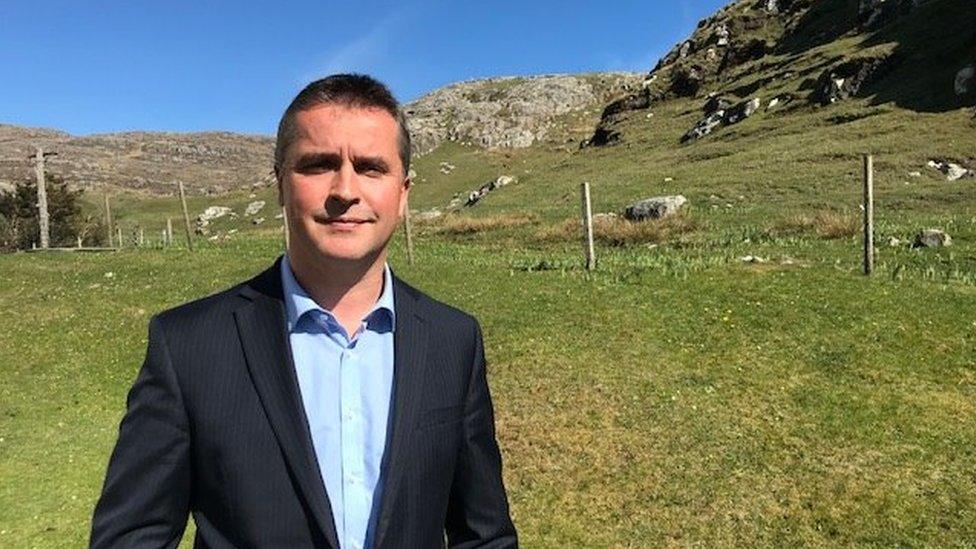
SNP MP Angus MacNeil at home in his constituency
He says there is no alternative but to travel to Parliament to ensure the scrutiny of the government.
On the voting arrangements for Parliament, he says he has had no difficulty with remote voting, calling the proposed plan for a return to divisions, with MPs trooping through the "aye" and "no" lobbies, "ridiculous".
"They are going to take twice as long as it does already," he says, with MPs having to keep socially distanced as they queue in the voting lobbies.
"I have some colleagues who will not attend who have underlying health conditions or who live with someone who does."
'Daft idea'
"It is a daft idea," says SNP MP Angus MacNeil. He points out that in his local area (his constituency is Na h-Eileanan an Iar in the Outer Hebrides) there have been only six cases of coronavirus and no deaths.
It is "mad" to expect him to go London, "the Covid hotspot of Europe", he adds.
"We're not out of the woods yet and they're ruling out the safety net of the virtual Parliament that is working just fine.
"I can vote faster, here in my croft in the Hebrides, than I can in Westminster."
Despite living in his constituency almost 400 miles away from Westminster, DUP MP Jim Shannon is chomping at the bit to get back to House of Commons.
"I can't wait to get back to Parliament, I've got my flights booked, " he says, adding: "I'm missing the cut and thrust of the chamber."
He argues that the virtual arrangements are no substitute for being there in person.
"You don't have any scrutiny," he says adding "whenever you are in the virtual parliament you are given a time slot, a guy in Westminster makes sure you are on and the picture is correct, he unmutes you for the question, then he mutes you."
"You can't intervene on a minister, the government needs to be challenged."
One thing that does worry him is the state of his Westminster office, with no one cleaning it for the past few weeks.
"It might look like one of those homes on that Channel 5 show where they need to bring in professionals," he says.
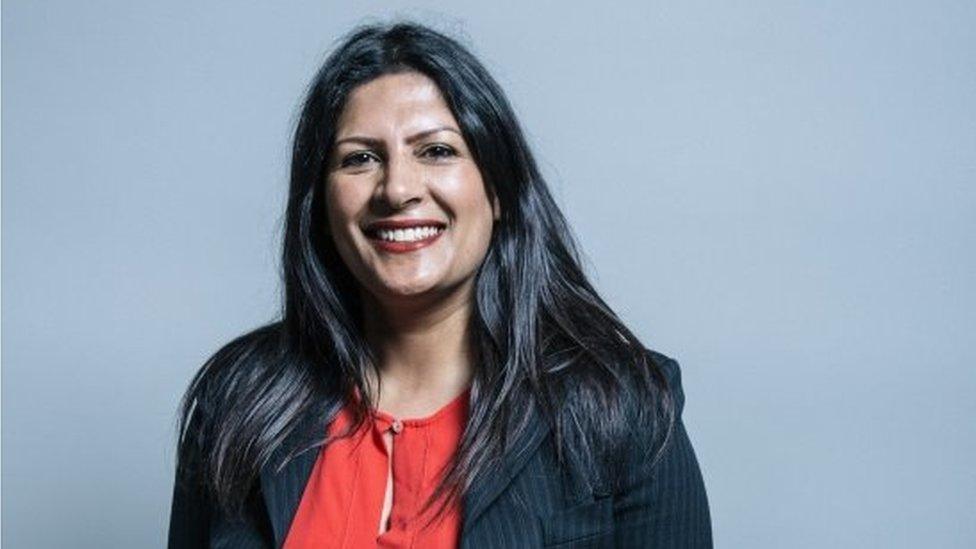
Preet Gill is concerned about MPs in vulnerable groups
Conservative MP Theresa Villiers agrees MPs need to return to Parliament - not only to improve scrutiny - but also for what goes on outside the chamber.
"The conversations you have in the corridor can be as important as the questions you ask in the chamber," she says .
"It'll be good to see those kind of networks operating again."
'Childcare a big issue'
Labour MP Preet Gill wants to return to Parliament but worries about her colleagues who are in vulnerable groups and can't travel to Westminster.
"If some can return and others can't there could be a backlash from constituents who'll want to know why their MP isn't in Parliament."
She also has concerns of her own. Her husband is a keyworker and her children are not in the year groups going back to school.
"Childcare is a big issue for us," she says.
And she is worried about statistics showing people from ethnic minorities are more likely to die from the virus than white people.
"We still don't know why that is, which means we still don't know what to do to protect ourselves."
Labour's shadow business and consumers minister Lucy Powell also raises the point that lots of her colleagues will have childcare issues and care issues and says the return without a virtual aspect disenfranchises "a lot of people".
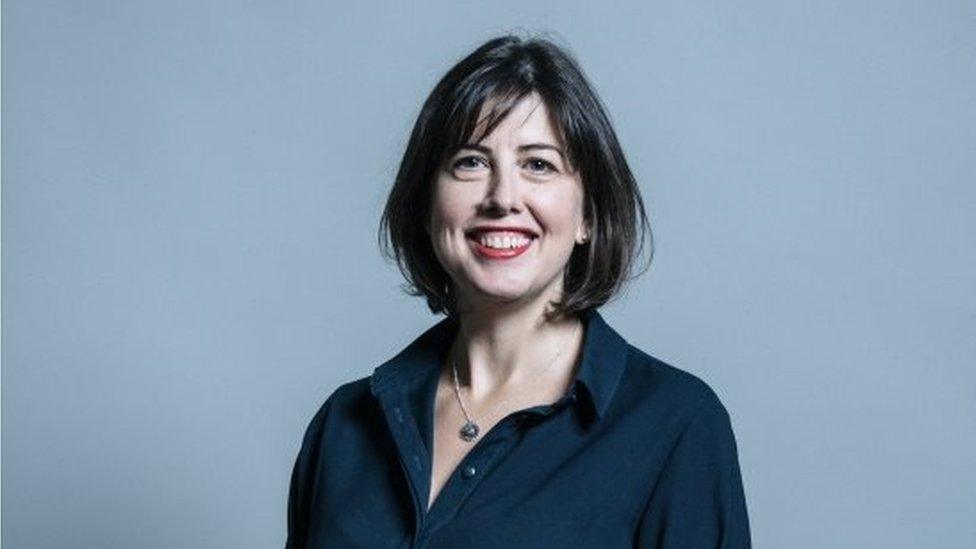
Labour MP Lucy Powell says a lot of MPs could be disenfranchised by new arrangements
The mum-of-three - who will have to travel from Manchester - also believes the issue is not the workplace aspect, it is how MPs get there and where they can stay.
The model for restarting Parliament has been "designed by one or two people in Parliament who live round the corner and have nannies", the MP for Manchester Central says.
But Conservative MP Henry Smith says while he understands the concerns of other MPs on the return of Parliament, he believes it is important that with schools and some businesses returning that "Parliament sets an example" - as long as social distancing is observed.
"The hybrid Parliament was necessary during the worse of the lockdown restrictions," the MP for Crawley says. "But it severely curtailed my ability to hold government to account."
He says debates have taken longer with virtual proceedings, with some MPs scheduled to speak not getting the opportunity to and there have been security concerns over remote voting.
'Perfect sense'
Conservative MP Sir Graham Brady says he is "perfectly happy" with how the Commons has adapted to social distancing, although he believes remote voting could have been kept with the return of physical voting in the lobbies.
He says "scrutiny of government has been less effective" during the virtual Parliament.
"It makes perfect sense to move back towards proper physical sittings," the MP for Altrincham and Sale West says.
Speaking to Today in Parliament, Leader of the House of Commons Jacob Rees-Mogg said that the Commons, when not meeting in a physical format, "does not provide proper scrutiny, nor does it make legislative progress".
He insisted it would be voting could be done safely in a social distancing way and most parliamentary staff would still be working from home - meaning the corridors of Westminster would be relatively sparsely populated.
He also said those MPs in vulnerable groups who have to stay at home would still be able to participate through virtual select committees and written questions.
- Published29 May 2020
- Published28 May 2020
